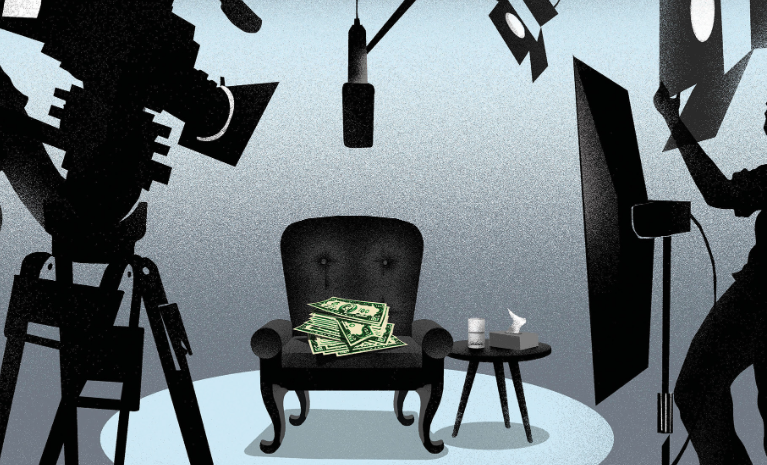1. The Writers Who Helped Bring Television to its Golden Age
It is disappointing that boom towns often suffer and those who benefit the most are not the hardworking people, but the merchants. On Tuesday, the Writers Guild of America went on strike, mainly because writing for television no longer guarantees a sustainable income. As someone who has witnessed the evolution of TV from being criticized as the “idiot box” to becoming a significant art form in this century, this situation is both ridiculous and sorrowful.

A decade ago, American television experienced a surge of high-quality programming. Popular shows like “Game of Thrones” and “Homeland” were being produced by paid subscription services, while almost every available basic cable channel began creating their own top-tier shows after AMC’s success with “Mad Men”. Even the History Channel won several Emmys for their series “Hatfields & McCoys”.
2. Can Streaming Platforms Afford to Neglect Writers ?
Broadcast networks wanted to make sure they were not left behind. Their shows still had 10 to 12 million viewers each week. But the show “Scandal” was different, because it used Twitter for people to talk about it. Netflix and Amazon also started doing new things like making shows only available on their sites. People who have Amazon Prime could even vote on which shows should be made into a series. At the time, we did not realize that streaming would ultimately disrupt the entire industry.

Television was very popular, and it drew people from movies, books, and plays. Writers would come to Hollywood and offer their ideas. It was just like when movies first started talking and when casino game online became popular for those who liked to make good money
New York may want to take note, as it appears the playwrights may be returning to Hollywood
A system of success has replaced the dominance of ratings. This system looks at many things to help measure how popular a TV show is. These things include awards like Emmys and magazine covers, but also newer things like blogs, social media posts, Comic-Con events, recaps of the show, and Netflix algorithms. The beneficiaries of this system, at least initially, seem to be the writers.
3. Why We Shouldn’t Forget the Creatives Behind TV’s Success
In the past, TV was mainly controlled by writers, not directors. However, few viewers knew who the series creators or episode writers were. Nowadays, television is a popular art form and writers are becoming more well-known. Matthew Weiner, Vince Gilligan, Shonda Rhimes, Ryan Murphy, Jenji Kohan, Damon Lindelof and Michelle and Robert King are writers who are very famous.

They are like celebrities! This level of recognition was previously reserved for only Norman Lear and perhaps David Chase.
4. Exploring the Impact of Streaming Services on Traditional Television Writing and Production Models
It was important for writers who had never worked for TV networks like HBO, Showtime or FX. They did not have to worry about ratings, what executives said, if they could say certain things and how many episodes they had to write. In 2007, people realized that digital rights were important and this made it easier for writers to be more creative with what they wrote.

Streaming services also made it easier for them to be creative.
They were happy to have platforms that let them tell stories without repeating things they had already said and without waiting for commercials or for a season to end. The viewers were also impressed, even those who only watch PBS. This marked a turning point in television’s reputation as an art form. The people who produced TV seemed to finally recognize its boundless potential.
5. Examining What Happens When Creative Talent is Undervalued in a Rapidly Changing Industry
People were worried about if there would still be enough TV shows when there was less money for ads. But streaming services figured out a new way to make money without ads. In 2015, someone said we had too many TV shows, but even more TV shows and streaming services kept coming out.

People questioned where all the money was coming from
It was discovered that many writers were responsible for TV’s latest Golden Age. However, while streaming merchants made billions, these writers were not compensated fairly. While some writers became multimillionaires, most did not. This change caused writers to lose lots of money because they were not able to make money from network series.

Services like Netflix, Amazon, 1xBet and Hulu are competing with TV networks.
This competition has made it harder for TV writers to make money from their work. These include lost residuals, shorter seasons, smaller writers rooms, and commissions for shows that were never made. As a result, finding a full-time job in the television industry has become even more challenging.
6. Strategies for Ensuring That Writers Are Properly Compensated For Their Work In the Future
The current situation is both unfair and unsustainable. The reason streaming even exists is because television was once a groundbreaking concept that attracted the most skilled and innovative writers, who were able to create exceptional storylines.
Studios and streaming platforms should not only hire established writers as spec script-writing freelancers, but also offer freelance writers the opportunity to become established writers. Unfortunately, this is not happening, and many writers are dismissed before a show even goes into production. This not only deprives them of wages but also limits their chances to learn about television production and advance in their careers.
The streaming industry has used the success of television’s Golden Age to bring about positive changes in the world. However, it is crucial to protect the writers who have contributed to this success to sustain the growth of the industry. Despite the potential for more success, it will be worthless without writers to create the content.





